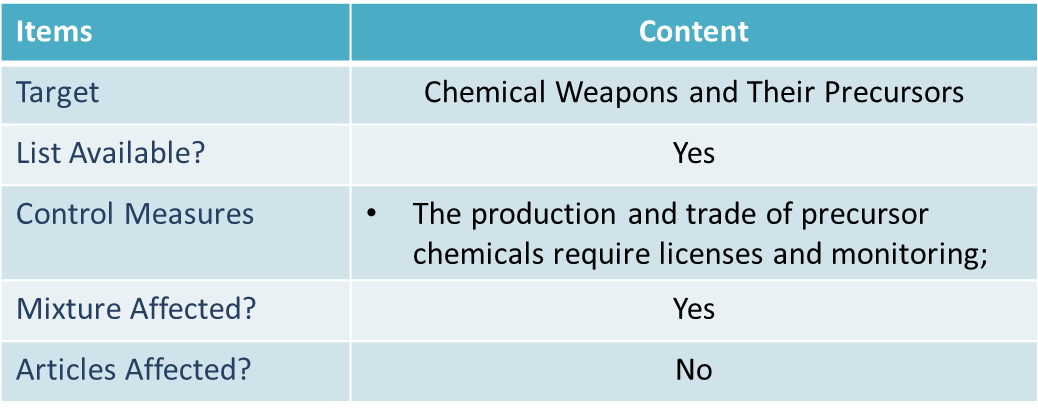Chemical Weapons Convention (CWC)
Little Pro on 2016-01-07
The Chemical Weapons Convention (CWC) is an arms control treaty prohibiting the development, production, acquisition, stockpiling, retention, transfer or use of chemical weapons by States Parties. It is administered by the Organisation for the Prohibition of Chemical Weapons (OPCW) and entered into force in 1997.
The Convention also requires each State Party to adopt the necessary measures to ensure that toxic chemicals and their precursors are only developed, produced, retained, transferred, or used within its territory for purposes not prohibited under this Convention. The table below gives you an overview of the Convention.

Lists of Scheduled Chemicals in the CWC
Scheduled chemicals, which are explicitly specified in the Convention for monitoring purposes, include chemical warfare agents and their key precursors. These chemicals are listed in the 3 Schedules of the Convention’s Annex on Chemicals. In addition to controlling the 3 Schedules of specified chemicals, the Convention also monitors other chemicals not specifically listed in the Schedules (called Discrete Organic Chemicals).
Each type of controlled chemicals has different requirements. The table below gives a brief summary of how they are controlled by the CWC.
| Schedule 1 |
|
| Schedule 2 |
|
| Schedule 3 |
|
| Discrete organic chemicals |
|
Impacts of the Chemical Weapons Convention
The Chemical Weapons Convention has a broad impact on all chemical, pharmaceutical, and agrochemical enterprises and other related sectors that not only produce and process, but also consume and/or trade internationally those chemicals covered by the Convention. A considerable number of companies from other industrial or commercial sectors face obligations arising from the Convention.
Countries that have ratified the Convention usually have their own regulations to control chemical weapons and their precursor chemicals (for example, China). Business operators need to check their own national legislation for detailed requirements. Usually, the production, use and import/export of Scheduled chemicals require licenses. The quantities of schedule 2 & 3 chemicals produced, processed, consumed, imported and exported shall be declared to national authorities annually.
Reference & Resource
Having Questions?
We do not provide consultancy services. If you have questions or need any help, please contact our sponsor. You may also find an expert in CSP business directory below. If you are a consultant, you may get yourself listed in CSP business directory (free) or sponsor this page to leave your contact info on this page..

Tags: Topics - Convention, Controlled Chemicals Trade